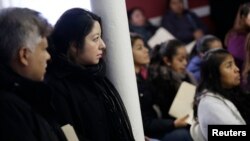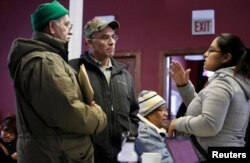Maria Herrera moved to the U.S. from Mexico with her parents 14 years ago. Though she has spent most of her life in the U.S., she is still undocumented.
That status and an upsurge in anxiety brought on by the promises of President-elect Donald Trump to be tough on immigration recently brought her to a "Know Your Rights" workshop in Hyattsville, Maryland. There, 100 people were told how to protect themselves and their families during immigration raids or arrests.
"I just had to come here today to get informed because I probably don't have much information, but they do," said Herrera, who is studying cosmetology and struggles to express herself in English.
All over the country, local immigrants' rights groups have been teaching undocumented immigrants their rights in the event they are detained by law enforcement — a mission that has taken on a new urgency after the election of Trump.
"I do have a lot of anxiety," conceded Herrera.
Constitution 'protects' everyone
At Sunday's workshop, members of the community played the roles of law enforcement officials and undocumented immigrants to demonstrate when and how attendees could invoke their constitutional rights.
Alma Couvorthie, senior director of community organizing at CASA de Maryland, said it is important to understand these rights "regardless of your immigration status" since every person in the United States is protected by the U.S. constitution.
"We all should know those rights and how to make them stand,” Couvorthie said. “The right to remain silent. The right of an attorney in case of an arrest, and to only provide our name and that you live in the state of Maryland. That's the only information you need."
During the conversation, which also commemorated International Migrant Day, advocates encouraged immigrants to learn about these basic rights, while telling them to "keep in mind" that they could "still be detained."
Couvorthie said these conversations prepare undocumented immigrants "beforehand" to create a network of support within their community in case of raids.
"Every moment that we spend preparing is going to give us peace of mind to deal when we have a confrontation with ICE or with police," she added.
'Obstructing' law enforcement
Recently, Trump has indicated he was "going to work something out" for undocumented youths like Herrera, who is part of the Deferred Action for Childhood Arrivals program (DACA), President Barack Obama's executive order that protected millions of undocumented immigrants known as dreamers.
Under the program Obama signed in 2012, 741,000 people received permission to work.
"They got brought here at a very young age, they've worked here, [and] they've gone to school here. Some were good students. Some have wonderful jobs. And they're in never-never land because they don't know what's going to happen," Trump said about DACA recipients in a Time Magazine "Person of the Year" interview.
He promised to do something to make "people happy and proud," but did not dismiss the idea of getting rid of DACA.
Not everyone would be sorry to see it go.
"No society should allow large-scale illegal immigration to be sustained at the level we have for as long as we have," said Dan Stein, president of the Federation for American Immigration Reform (FAIR).
Stein understood that "it's not a happy time" for DACA recipients, but said that workshops like the one in Hyattsville don't help.
"What really these organizations are doing are trying to make it difficult for law enforcement to actually determine who has a right to be here and who doesn't for the purposes of obstructing immigration law enforcement," he said.
No fear
DACA recipient Jose Manuel Perez moved to the U.S. when he was 13 years old; he is now 31. While he attended Sunday's rights workshop, he says he has no fear of the incoming administration.
"Not one moment. ... I have learned English. I went to school here," Perez said. His English is excellent.
Not only is Perez not fearful, he approves of Trump's election.
"We're just hoping that what he has on the table is going to turn the country around, because we do need change," Perez said.



